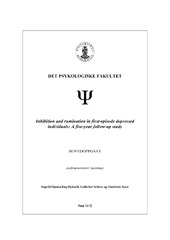Inhibition and rumination in first-episode depressed individuals: A five-year follow-up study
Master thesis

View/
Date
2015-11-23Metadata
Show full item recordCollections
- Faculty of Psychology [535]
Abstract
There is growing consensus that certain cognitive processes are critical in the development and maintenance of Major Depressive Disorder (MDD). A ruminative responsive style has been found to predict both severity and chronicity of MDD and has been linked to deficits in executive functions such as inhibition and mental flexibility. The present study investigated this relationship further in a five-year follow up (T3) of depressed individuals, who had previously been tested at first-episode MDD (T1) and at one-year follow up (T2). Whether rumination and/or inhibition could predict relapse at T2 and T3 was also studied. 30 subjects meeting the criteria for first-episode unipolar MDD and 30 controls were included in the study at T1. Rumination and inhibition was measured using the Ruminative Response Scale (RRS), Rumination-Reflection Questionnaire (RRQ) and the Color-Word Interference Test (CWIT) of the Delis-Kaplan Executive Function System. The results show a significant difference between patients and controls on both rumination and cognitive inhibition that persists over time. A correlation between cognitive inhibition and rumination was found across all subjects. However, the results did not show evicence of these factors being related to risk for relapse. Thus, impaired inhibition and increased rumination are long lasting characteristics in MDD. Det er økende enighet om at visse kognitive prosesser er kritiske i utvikling og opprettholdelse av Alvorlig Depressiv Lidelse (MDD). En ruminerende kognitiv stil har vært funnet å kunne predikere både alvorlighetsgrad og kronisitet i MDD og har blitt koblet til svakheter i eksekutive funksjoner som inhibisjon og mental fleksibilitet. I denne studien ble dette forholdet undersøkt nærmere gjennom en fem-årsoppfølging (T3) av førstegangsdeprimerte som tidligere hadde blitt testet ved første episode (T1) og ett år senere (T2). Det ble også undersøkt hvorvidt ruminering og/eller inhibisjon kunne predikere tilbakefall på T2 og T3. Tredve forsøkspersoner som møtte kriteriene for første episode av unipolar MDD og 30 kontrollpersoner ble innlemmet i studien på T1. Ruminering og inhibisjon ble målt ved hjelp av Ruminative Response Scale (RRS), Rumination Reflection Questionnaire (RRQ) og Color-Word Interference Test fra Delis-Kaplan Executive Function System. Resultatene viser en signifikant forskjell mellom pasient- og kontrollgruppe bade på ruminering og inhibisjon, som vedvarer over tid. Det ble funnet en sammenheng mellom inhibisjon og ruminering på tvers av gruppene. Resultatene viste imidlertid ingen sammenheng mellom disse faktorene og tilbakefallsrisiko. Det kan slås fast at svekket kognitiv inhibisjon og økt ruminering er karakteristiske trekk ved depresjon over tid.